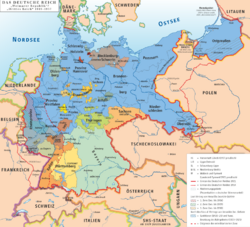Social:Fourth Reich
The Fourth Reich (German: Viertes Reich) is a hypothetical future Nazi Reich that is the successor to Adolf Hitler's Third Reich (1933–1945).
Origin
The term "Third Reich" was coined by Arthur Moeller van den Bruck in his 1923 book Das Dritte Reich. He defined the Holy Roman Empire (962–1806) as the "First Reich", and the German Empire (1871–1918) as the "Second Reich", while the "Third Reich" was an ideal state including all German peoples, including Austria. In the modern context the term refers to Nazi Germany. It was used by the Nazis to legitimize their regime as a successor state to the retroactively-renamed First and Second Reichs.
The term "Fourth Reich" has been used in a variety of different ways. Neo-Nazis have used it to describe their envisioned revival of an ethnically pure state, mostly in reference to, but not limited to, Nazi Germany.[1] Others have used the term derogatorily, such as conspiracy theorists like Max Spiers, Peter Levenda, and Jim Marrs who have used it to refer to what they perceive as a covert continuation of Nazi ideals.[2]
Neo-Nazism
Neo-Nazis envision the Fourth Reich as featuring Aryan supremacy, anti-Semitism, Lebensraum, aggressive militarism and totalitarianism.[3] Upon the establishment of the Fourth Reich, German neo-Nazis propose that Germany should acquire nuclear weapons and use the threat of their use as a form of nuclear blackmail to re-expand to Germany's former boundaries as of 1937.[3]
Based on pamphlets published by David Myatt in the early 1990s,[4] many neo-Nazis came to believe that the rise of the Fourth Reich in Germany would pave the way for the establishment of the Western Imperium, a pan-Aryan world empire encompassing all land populated by predominantly European-descended peoples (i.e., Europe, Russia , Anglo-America, Australia , New Zealand, and White South Africa).[5]
Usage to indicate German influence in the European Union
Some commentators in various parts of Europe have used the term "Fourth Reich" to point at the influence that they believe Germany exerts within the European Union.[6][7][8] For example, Simon Heffer wrote in the Daily Mail that Germany's economic power, further boosted by the European financial crisis, is the "economic colonisation of Europe by stealth", whereby Berlin is using economic pressure rather than armies to "topple the leadership of a European nation". This, he says, constitutes the "rise of the Fourth Reich."[9] Likewise, Simon Jenkins of The Guardian wrote that it is "a massive irony that old Europe's last gasp should be to seek ... German supremacy".[9] According to Richard J. Evans of the New Statesman, this kind of language had not been heard since German reunification which sparked a wave of Germanophobic commentary.[9] In a counterbalancing perspective, the "Charlemagne" columnist at The Economist reports that the German hegemony perspective does not match reality.[10]
In August 2012, the Italian newspaper Il Giornale had as headline the phrase "Fourth Reich" (Quarto Reich) as a protest against German hegemony.[11]
This perspective gained particular traction in the United Kingdom in the run up to 2016 EU referendum and the subsequent negotiations.[12]
See also
- Eurabia
- Europe a Nation
- Far-right politics in Germany
- Neo-Nazism
- Neo-Sovietism
- Pan-European identity
- Pan-European nationalism
- Pan-nationalism
- Third Rome
- United States of Europe
- Fifth International
References
- ↑ Reitman, Janet (2018-05-02). "All-American Nazis: Inside the Rise of Fascist Youth in the U.S." (in en-US). Rolling Stone. https://www.rollingstone.com/politics/politics-news/all-american-nazis-628023/.
- ↑ Bullen, Jamie (17 October 2016). "Conspiracy theorist discussed 'Fourth Reich' in final interview" (in en-GB). Evening Standard. https://www.standard.co.uk/news/uk/conspiracy-theorist-max-spiers-discussed-rise-of-fourth-reich-in-final-interview-before-mysterious-a3370686.html.
- ↑ 3.0 3.1 Schmidt, Michael (1993). The New Reich: Violent Extremism in Germany and Beyond. ISBN 9780091780043.
- ↑ These writings of Myatt included the 14 pamphlets in his Thormynd Press National-Socialist Series, most of which were republished by Liberty Bell Publications (Reedy, Virginia) in the 1990s, and essays such as Towards Destiny: Creating a New National-Socialist Reich [archived at https://web.archive.org/web/20040712101315/http://www.geocities.com/myattns/newreich.html] and a constitution for the 'fourth Reich' [archived at https://web.archive.org/web/20041208070520/http://www.geocities.com/myattns/cons_reich.html]
- ↑ Goodrick-Clarke, Nicholas (2002). "Chapter 4: Imperium and the New Atlantis; Chapter 11: Nazi Satanism and the New Aeon". Black Sun: Aryan Cults, Esoteric Nazism, and The Politics of Identity. New York: N.Y. University Press. ISBN 978-0814731550. https://books.google.com/books?id=xaiaM77s6N4C&lpg=PP1&hl=pt-BR&pg=PA72.
- ↑ Heffer, Simon (15 May 2016). "The Fourth Reich is here - without a shot being fired" (in en-GB). The Daily Telegraph. https://www.telegraph.co.uk/news/2016/05/15/the-fourth-reich-is-here---without-a-shot-being-fired/.
- ↑ "Merkels Tyskland - Fjärde Riket?" (in sv). Yle. 4 May 2016. https://svenska.yle.fi/artikel/2015/04/26/merkels-tyskland-fjarde-riket.
- ↑ "'The Fourth Reich': What Some Europeans See When They Look at Germany". Spiegel Online. 23 March 2015. https://www.spiegel.de/international/germany/german-power-in-the-age-of-the-euro-crisis-a-1024714.html.
- ↑ 9.0 9.1 9.2 Evans, Richard J. (24 November 2011). "The myth of the Fourth Reich" (in en). The New Statesman. https://www.newstatesman.com/europe/2011/11/germany-european-economic.
- ↑ Charlemagne (11 June 2019). "Wurst among equals: Contrary to popular belief, Germany does not in fact run the EU". The Economist. https://www.economist.com/europe/2019/07/11/wurst-among-equals. Retrieved 25 June 2019.
- ↑ Germany outraged by Italian newspaper’s ‘Fourth Reich’ headline
- ↑ O'Toole, Fintan (2018-11-16). "The paranoid fantasy behind Brexit | Fintan O'Toole" (in en-GB). The Guardian. ISSN 0261-3077. https://www.theguardian.com/politics/2018/nov/16/brexit-paranoid-fantasy-fintan-otoole.
Bibliography
- Infield, Glenn (1981). Secrets of the SS. New York: Stein and Day. ISBN 0-8128-2790-2. https://archive.org/details/transactionsand04unkngoog.
- Marrs, Jim (2008). The Rise of the Fourth Reich. New York: William Morrow. ISBN 9780061245589. https://archive.org/details/riseoffourthreic00marr.
- Rosenfeld, Gavriel D. (2019). The Fourth Reich: The Specter of Nazism since World War II. Cambridge University Press. doi:10.1017/9781108628587. ISBN 9781108628587. https://www.cambridge.org/core/books/fourth-reich/000A2D0359E5495E528B01BB8050A29B.
- Schultz, Sigrid. Germany Will Try It Again (Reynal & Hitchcock, New York, 1944)
- Tetens, T.H. (1961). The New Germany and the Old Nazis. New York: Random House. ISBN 9781131026664. https://archive.org/details/newgermanyoldnaz0000tete.
- Wechsberg, Joseph (1967). The Murderers Among Us: The Simon Wiesenthal Memoirs. New York: McGraw-Hill. https://archive.org/details/murderersamongus00wies.


